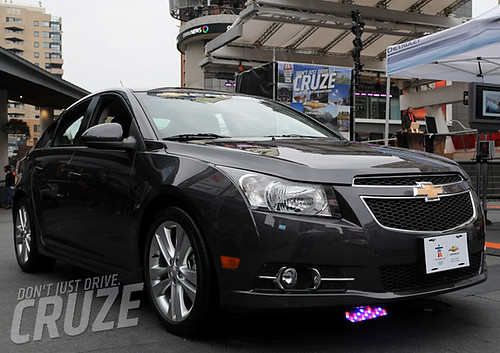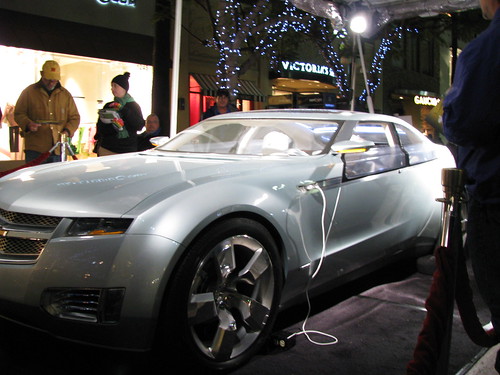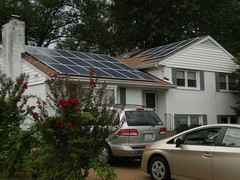( – promoted by lowkell)
The Washington Post editorial board has waged a campaign against electrification of the nation’s transportation system  (especially cars), often using true facts in a fashion that creates untruthful truthiness. Whacking such moles is, well, exhausting since it is easier to spin truthiness than to be truthful. Charles Lane’s OPED celebrating a temporary closure of the Chevy Volt line provides multiple examples of truthiness-laden editoralizing.
(especially cars), often using true facts in a fashion that creates untruthful truthiness. Whacking such moles is, well, exhausting since it is easier to spin truthiness than to be truthful. Charles Lane’s OPED celebrating a temporary closure of the Chevy Volt line provides multiple examples of truthiness-laden editoralizing.
Following guidance from The Debunking Handbook, following the fold are a few truths with examples of how Lane misleads Washington Post readers.
Compare Apples to Apples
Any auto buyer knows that a BMW delivers a different vehicle — with a different price tag — than the typical KIA, a Lamborghini isn’t a Fiat, a … When shopping for cars, amid the myriad of different options, a buyer will try to compare same to same.
EV-opponents all too often slip in a comparison that violates this rule when they are seeking paths to dismiss the value of hybrids (HEVs), plug-in hybrids (PHEVs), and all-electric vehicles (EVs). Thus, in today’s OPED, Charles Lane compares the Chevy Volt to the Chevy Cruze. Simply put, these two are not in the same league.
 The Chevy Cruze is a compact — nicely built, with good gas mileage, compact. Comparison shop against the Honda Civic, Toyota Corolla and Ford Focus.
The Chevy Cruze is a compact — nicely built, with good gas mileage, compact. Comparison shop against the Honda Civic, Toyota Corolla and Ford Focus.
The Chevy Volt is a mid-size car — with higher end interior, more bells and whistles, along with being a PHEV. In addition to the Nissan Leaf (EV) and Prius (HEV) comparison, look to the Lexus HS250H as something to consider against the Volt.
I’ve had the chance to test drive both the Cruze and the Volt. There is no driver out there who would assert that the Volt is not more luxurious and a better drive (even as there might be reasons a buyer would choose a Cruze over a Volt … for example, the Volt is a four seater while the Cruze seats five).
To compare the Volt to the Cruze is rhetorical gamesmanship that ignores that these are different vehicles, with different handling characteristics, different comfort packages, different ‘wow’ / prestige factors, different values …
To compare the Volt to the Cruze, without  highlighting these differences, is to abandon truthful discussion for truthiness deception.
highlighting these differences, is to abandon truthful discussion for truthiness deception.
There are many value streams
Even when truly comparing similar comfort levels (apples to apples), when compared to traditional gasoline engines, EVs/HEVs/PHEVs provide many value streams. For example, what price do I place on being able to listen to birds when coasting in my Prius (since the gas motor isn’t running, being able to drive in a garage without belching exhaust, having the (perhaps mistaken) status symbol of an ‘earth-friendly’ car (as if this isn’t an oxymoronic concept), or having to do about 1/3rd fewer stops at gas stations? There is a reason why automobile reviewers don’t diss the concept of people paying extra for spoilers or racing stripes or particular paint jobs — there are many value streams that car buyers place in their decisions, from esthetics to family size to financials.
And, for the overall society, the EV offers some quite interesting values from reduced ground level pollutants (fewer cancer causing chemicals spewing out into pedestrians’ faces) to the ‘Smart Grid’ opportunity to stabilize the grid via V2G (Vehicle-to-Grid) technology allowing use of car batteries as distributed power storage devices.
When it comes to EV discussions, anti-EV polemics typically ignore all other elements and stove-pipe into the narrowest of comparisons. Charles Lane is no exception.
Gas savings on the Volt would take nine years at $5 per gallon to offset its higher price over the Cruze
Again, comparing the high-end Volt so casually the Cruze is deliberate editorial deception, but this necking down to solely gasoline prices is to ignore all the other legitimate value streams meriting consideration and illumination in policy debates over transportation technologies and futures.
Electric Vehicles Maintain Value
A number of years ago, I had the chance to see a Toyota RAV4 EV. For a car with 100,000+ miles, looking under the hood was astounding — near spotless, it appeared near brand-new compared to an internal combustion engine. (Another EV value stream: greatly reduced maintenance costs, by the way.) And, talking to the owner, he said that he regularly had unsolicited purchase offers above what it had cost him. Okay, the resale above purchase value is a bit unusual but take a look at used Toyota Prius prices according to MotorTrend: a 2004 Prius is at nearly $11,000 or more than half the original sticker price which, by the way, is right in line with the Honda Accord resale record. And, according to Consumer Reports, the Prius is #1 when it comes to retaining value for resale.
EV opponents spin webs to assert that EV/PHEV/HEVs lose value more rapidly than other cars.
Oh, how are you supposed to resell your electric vehicle once you’ve driven it five years and the battery is depleted?
According to Charles Lane, we should ignore Consumer Reports and that 2004 Prius has zero value.
An Individual Can Have a Say on Their Electricity’s Carbon Load
Something to consider:
- With every passing day, the U.S. liquid fuel supply is becoming ‘dirtier’ due to oil from ever-deeper rigs, increasing tar sands supplies, and otherwise.
- With every passing day, the U.S. electricity grid is becoming cleaner with reduced (and slightly less polluting) coal electricity (often replaced with natural gas) and increased renewable energy supplies
In addition, the ‘average’ car owner has little option over the ‘cleanliness’ of their fuel supply (what choice do you have at the gas station?) while most home owners  have options to ‘clean’ their electricity (whether through putting solar on the roof, switching to a clean electricity provider, or buying renewable energy credits to cover their demand).
have options to ‘clean’ their electricity (whether through putting solar on the roof, switching to a clean electricity provider, or buying renewable energy credits to cover their demand).
EV opponents often try to demean the PHEVs/EVs by stating that moving from gasoline to electricity is simply a move from one fossil foolish path to another. As Lane put it,
another fact about electric vehicles is that their juice comes from the fossil-fuel-burning grid in the first place
Putting aside the fact that analysis shows that electric vehicles are less polluting, even when operated off a fully coal-powered electricity system (when coal is about 45% of U.S. electricity and declining (though many get this wrong)), this ignores the truth that an EV driver has paths to assure a low-to-non fossil fuel electricity supply.
In short, truthful engagement matters on issues of public policy. Sadly, when it comes to discussing electrification of transportation, The Washington Post editorial board continues to fall short on this basic standard.
NOTE: Some relevant discussions,



![[UPDATED with Official Announcement] Audio: VA Del. Dan Helmer Says He’s Running for Congress in the Newly Drawn VA07, Has “the endorsement of 40 [House of Delegates] colleagues”](https://bluevirginia.us/wp-content/uploads/2026/02/helmermontage.jpg)














